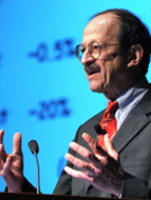Dr Harold Varmus
The second Fulbright Annual Lecture Series was delivered by Dr Harold E. Varmus, co-recipient of the Nobel Prize for studies of the genetic basis of cancer, and Director of the US National Cancer Institute.

International relations in science and medicine: Three case studies
Event details
Date: Thursday 9 May 2013, 5.15pm - 6.15pm
Venue: Business School Auditorium, 29 Buccleuch Place, Edinburgh
Series overview
Economically advanced countries have a variety of reasons to share their expertise in science, technology, and medicine with poor nations.
These three lectures explore the histories of three different programs, addressing three different types of human diseases, in which the United States has formed partnerships with other countries to improve science and public health.
Each lecture is intended to illuminate in non-technical language how and by whom these programs were initiated, what the programs achieved, and what lessons can be drawn from them.
May 3, Pembroke College, Oxford Case #1: The Uganda Cancer Institute
The first lecture will describe how the discovery of an unusual childhood cancer by a UK investigator in East Africa led to the founding of a center for cancer care, research, and training in Kampala by the US National Cancer Institute; how the UCI has been sustained for over 45 years despite dramatic political changes in Uganda; and what the future now holds for the Centre in its efforts to treat cancers more effectively and train new cancer researchers.
May 7, Kings College, London Case #2: The US President's Emergency Plan for AIDS Relief
The second lecture will examine the features of the AIDS epidemic that contributed to the launch of an ambitious and successful program by President George W. Bush to prevent and treat HIV infections in a large number of poor countries. Special attention will be given to the precedents, people, and arguments that convinced the Bush administration to undertake this program and then describe its development and current status.
May 9, Edinburgh University, Edinburgh Case #3: The Malaria Research and Training Center in Bamako, Mali
The final lecture will trace how studies of the mosquito that carries the causative agent of malaria led to the establishment of a center for malaria research and training, strongly supported by a component of the US National Institutes of Health, in Bamako, Mali. It will also address how the MRTC has dramatically affected the lives of Malians and how the Centre is faring in the current period of unrest in Mali.
Lecture audio
- Video: Fulbright lecture - Harold Varmus
- Streaming audio of Dr Harold Varmus's Fulbright lecture 'International relations in science and medicine'
About the lecturer
Dr Harold E. Varmus has had a distinguished academic and medical career. His award winning biomedical research has focussed on the behaviour of retroviruses. In 1989 the Nobel Prize for Medicine was awarded jointly to Dr Varmus and Dr J. Michael Bishop for their discovery of the cellular origin of retroviral oncogenes.
Dr Varmus became Director of the National Cancer Institute on 12 July 2010, after 10 years as President of Memorial Sloan-Kettering Cancer Center and six years as Director of the National Institutes of Health. He is a member of the US National Academy of Sciences and the Institute of Medicine. He is involved in several initiatives to promote science and health in developing countries.
The author of over 350 scientific papers and five books, including a recent memoir entitled The Art and Politics of Science, Dr Varmus was a co-chair of President Obama’s Council of Advisors on Science and Technology. He was also a co-founder and Chairman of the Board of the Public Library of Science, and chaired the Scientific Board of the Gates Foundation Grand Challenges in Global Health

